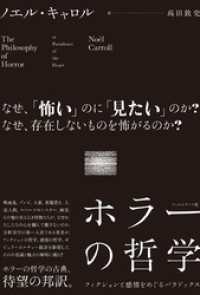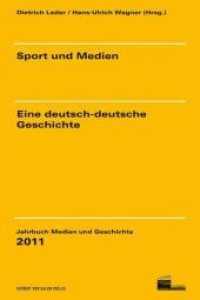- ホーム
- > 洋書
- > 英文書
- > Religion / Ethics
Full Description
In Christian theology, the teaching that Christ possessed both a human and divine will is central to the doctrine of two natures, but it also represents a logical paradox, raising questions about how a person can be both impeccable and subject to temptation. This volume explores these questions through an analytic theology approach, bringing together 15 original papers that explore the implications of a strong libertarian concept of free will for Christology. With perspectives from systematic theologians, philosophers, and biblical scholars, several chapters also offer a comparative theology approach, examining the concept of impeccability in the Muslim tradition.
Therefore, this volume will be of interest to scholars and graduate students working in analytic theology, biblical scholarship, systematic theology, and Christian-Islamic dialogue.
Contents
Part I Was Christ Sinless? Exegetical and Historical Approaches 1 The Sinlessness of Christ and Human Perfection 2 Sinless or Not? The Baptism by John and Jesus' Consciousness of his Personal Sins 3 "He Himself Was Tempted" (Hebr 2:18): The Temptation of Jesus in the New Testament 4 God's Work and Human's Contribution: Jesus' Sinlessness in Theodore of Mopsuestia's Christology 5 Conciliar Christology, Impeccability, and Temptation Part II Is Christ Impeccable? Systematical Approaches 6 Seven Questions Ingredient to Jesus Christ's Temptation 7 The Hypostatic Union and the Freedom of Christ 8 Classical Theism, Christology, and the Two Sons Worry 9 Peccable as Son of Man, Impeccable as Son of God: An Attempt to Reconcile Freedom and Impeccability 10 The Divine and Human Will of Christ 11 Deification and the Divided-Consciousness-View Part III Human Perfection and Sinlessness in Islamic Theology 12 The Scope of 'Iṣma and Qur'anic Evidence 13 Inerrancy and Exaggeration in Shi'I Theology 14 The Theological Concept of Imamate: How Imamis Reconcile Human Perfection and Free Will








